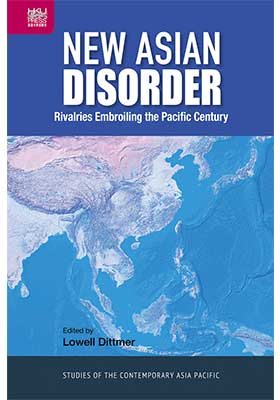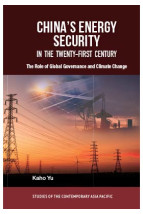New Asian Disorder
Rivalries Embroiling the Pacific Century
(形成中的亞洲失衡秩序:席捲太平洋世紀的國際競爭)
ISBN : 978-988-8754-02-1
Studies of the Contemporary Asia Pacific
December 2021
288 pages, 6″ x 9″, 20 b&w figs. & 12 tables
- HK$630.00
Ebooks
Also Available on
In New Asian Disorder: Rivalries Embroiling the Pacific Century, Lowell Dittmer and his team explore the recent political disorder in East Asia resulting from growing Sino-American polarization. The rise of China in recent years is widely regarded as a momentous shift in the global balance of power. China is now extending sovereignty into the East China Sea and the South China Sea, constructing a new set of global financial institutions and replacing “universal values” with technologically enhanced nationalism. The country’s “Belt and Road Initiative” is also tainted by the vast ambition to realize the “China Dream” within the foreseeable future. In response to China’s challenge, the United States has abandoned its “constructive engagement” policy towards the rising power and engaged in a trade war. Sino-American relations have been at a historical trough since the normalization of their relationship in the late 1970s. This book sheds new light on the current political disorder in the East Asian international arena. The new Asian disorder is analyzed from three perspectives: the first focuses on identity, the second on political economy, and the third on the triangular dynamic. This collection of essays concludes that, unless and until consensus can be reached on a coherent new framework for cooperation and rule enforcement among different stakeholders in East Asia, the current disorder may be expected to persist.
“Focusing on the impact of Xi Jinping and Donald Trump, this book sees rivalries undermining the post–Cold War order but not leading to a full breakdown. Stress is on identities, strategies, and triangles related to the Sino-US rivalry. Dittmer argues that these factors will drive further changes. Readers will find a diversity of approaches on a most critical bilateral relationship.” —Gilbert Rozman, Princeton University; editor of The Asan Forum
“A great read to better comprehend the ‘New Asian Disorder’ that the growing China-US rivalry has been contributing to, as well as its implications for the other actors of the region, be they big as Japan or smaller as Australia, Southeast Asian nations or Taiwan.” —Jean-Pierre Cabestan, Hong Kong Baptist University; senior research fellow of the French Research Institute on East Asia, Inalco, Paris






